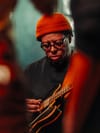Jeff Parker's Adventures in Inner Space
Best known to rock fans for his trailblazing work in Tortoise, the guitarist has established himself as one of the most quietly adventurous players in jazz. To hear him tell it, he’s just following the sound.

The stage at Brooklyn’s Public Records is only a couple of feet off the ground. When the room is packed, you realize it’s made more for immersion than observation. In early December, as part of the 10-year anniversary celebration for beloved Chicago jazz label International Anthem, guitarist Jeff Parker and his band, the ETA IVtet, performed for a stylish sea of 200-plus winter coats and beanies all huddled together in hushed excitement. As Parker and co. took the stage, a volley of applause broke out and died down quickly as they sat—save upright bassist Anna Butterss, whose face and headstock barely peeked above the crowd. Then, the sound of Josh Johnson’s alto saxophone rose up, almost imperceptibly at first. He tapped one of the pedals at his feet to loop it into a drone. A few beats later, Parker’s guitar gently settled on the same note, and the two built a delicate chord. A text notification chime rang out in the crowd, but no heads whipped around to shush; it was perfectly in key.





